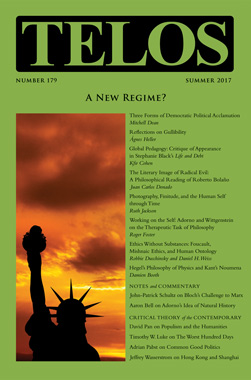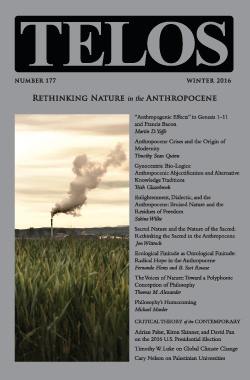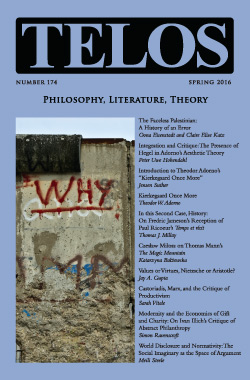By Steven Torrente · Wednesday, January 31, 2018 Steven Torrente’s “Beyond Just War: Jan Patočka’s Solidarity of the Shaken” appears in Telos 181 (Winter 2017). Read the full article at the Telos Online website, or purchase a print copy of the issue in our online store. Individual subscriptions to Telos are now available in both print and online formats.
The just war tradition has for a long time provided the categories and logic used to debate the tensions inherent in armed conflict. If war and killing are seen as both inevitable and undesirable, some system of limitation must be developed. Just war concepts such as right authority, just cause, and others offer a framework of off-ramps on the road to nihilistic violence. However, critics contend that just war theory fails to negotiate a real compromise between naïve pacifism and unrestrained war. They argue that the just war tradition not only reduces to the unrestrained pole, but in fact it can legitimate and exacerbate war. If so, just war thinking suffers from a logical contradiction—it facilitates that which it seeks to limit.
Continue reading →
By Michael Marder · Friday, June 16, 2017 Critique of phenomenology amounts to a tiny piece of the puzzle that is Gianni Vattimo and Santiago Zabala’s thought-provoking Hermeneutic Communism: From Heidegger to Marx. According to the spot allocated to it, phenomenology fits in with the other manifestations of classical metaphysics, bent on preserving the transcendental privilege of immutable truth. In what follows, I will argue that such placement may not do justice to phenomenology, which, in its most critical manifestations, is an ally of hermeneutic communism. This particular piece of the puzzle belongs on the other side of the intellectual and historical barricades, and, more importantly, holds the potential for mediating between the various opposed camps—description and interpretation, realism and anti-realism, the strong and the weak, metaphysics and postmetaphysics—that Vattimo and Zabala keep apart.
Continue reading →
By Russell A. Berman · Monday, June 12, 2017 Telos 179 (Summer 2017) is now available for purchase in our store.
 When the historian Ken Burns spoke at the Stanford University commencement last June, he delivered an exceptionally political address, including an attack on what he labeled the “Vichy Republicans.” Those Republican leaders who had not distanced themselves from candidate Trump, so Burns, were the equivalent of the Vichy French who collaborated with Hitler. That master metaphor, comparing 2016 to 1933, has continued into the new administration, with the anti-Trump camp labeling itself as “the resistance.” Despite Burns’s historiographical authority, one might question the validity of the underlying equation. No doubt the policies of the Trump administration are more conservative than those of Obama—hardly surprising—but the paradigms of the totalitarianism of the twentieth century are not necessarily the most adequate theoretical tools to analyze early twenty-first-century political phenomena. As emotionally satisfying as it may be for some to try to relive battles of earlier decades, Critical Theory ought to try to do better. We may very well be entering a different political era, a new regime, and not only in the United States. Can we describe it more effectively? When the historian Ken Burns spoke at the Stanford University commencement last June, he delivered an exceptionally political address, including an attack on what he labeled the “Vichy Republicans.” Those Republican leaders who had not distanced themselves from candidate Trump, so Burns, were the equivalent of the Vichy French who collaborated with Hitler. That master metaphor, comparing 2016 to 1933, has continued into the new administration, with the anti-Trump camp labeling itself as “the resistance.” Despite Burns’s historiographical authority, one might question the validity of the underlying equation. No doubt the policies of the Trump administration are more conservative than those of Obama—hardly surprising—but the paradigms of the totalitarianism of the twentieth century are not necessarily the most adequate theoretical tools to analyze early twenty-first-century political phenomena. As emotionally satisfying as it may be for some to try to relive battles of earlier decades, Critical Theory ought to try to do better. We may very well be entering a different political era, a new regime, and not only in the United States. Can we describe it more effectively?
Continue reading →
By Aidin Keikhaee · Friday, January 6, 2017 In this essay I attempt to sketch out the possibility of a response to the problem of the relation between ethics and politics in Emmanuel Levinas’s philosophy. Levinas’s ethics as first philosophy is revolutionary, and promising, but it leads to a gap between ethics and politics. This is a genuine problem, since depending on how one problematizes this gap and responds to it, one may end up with different, even opposing, views of Levinas’s thought, ranging from the right side of the political spectrum to its very left. In order to respond to this problem, I examine the possibility of a constructive dialogue between Levinas’s ethics and Adorno’s negative dialectics. In particular, I approach the relation between ethics and politics in Levinas from the standpoint of the question of history.
Continue reading →
By Jon Wittrock and Richard Polt · Monday, December 12, 2016 Telos 177 (Winter 2016) is now available for purchase in our store.
 While the term Anthropocene was used in the USSR already in the 1960s to refer to the late Quaternary era, it rose to prominence more recently when introduced by Eugene F. Stoermer and Paul J. Crutzen. As the very word indicates, this is an epoch when humanity has taken center stage in the sense that its activities now have a major, global, and lethal impact. The shadow of human-caused global destruction and mass death haunts this epoch, and indeed, humanity’s newly acquired capacity for devastation is one of the Anthropocene’s most marked traits. While mass extinctions are hardly new phenomena and while the specter of the extinction of humanity due to some sudden catastrophe was there even before human beings were aware of it in scientific terms, the actual capacity of humanity to extinguish itself along with a large swath of other species on the planet is new, and the stakes of human action are higher. While the term Anthropocene was used in the USSR already in the 1960s to refer to the late Quaternary era, it rose to prominence more recently when introduced by Eugene F. Stoermer and Paul J. Crutzen. As the very word indicates, this is an epoch when humanity has taken center stage in the sense that its activities now have a major, global, and lethal impact. The shadow of human-caused global destruction and mass death haunts this epoch, and indeed, humanity’s newly acquired capacity for devastation is one of the Anthropocene’s most marked traits. While mass extinctions are hardly new phenomena and while the specter of the extinction of humanity due to some sudden catastrophe was there even before human beings were aware of it in scientific terms, the actual capacity of humanity to extinguish itself along with a large swath of other species on the planet is new, and the stakes of human action are higher.
Continue reading →
By Russell A. Berman · Monday, March 14, 2016 Telos 174 (Spring 2016): Philosophy, Literature, Theory is now available for purchase in our store.
 In this issue, Telos turns to a diverse set of philosophers, contemporary and classical, and questions, concerning ethics and politics on the one hand, and literature and aesthetics on the other. More often than not, those distinctions turn out to be difficult to maintain. A case in point is the opening essay, which examines how statements by Levinas have been subjected to political readings in order to impute to him positions that he did not hold. What are the ethics of intentional misreadings? In their meticulously argued analysis, Oona Eisenstadt and Claire Elise Katz demonstrate how the philosopher’s comments in a 1982 radio interview, in the immediate aftermath of the massacres in the Sabra and Shatila refugee camps in Lebanon, have been subjected to increasing degrees of misrepresentation, culminating in false accusations that he justified the killings. These insinuations involved fabricating quotations to put words in his mouth. Eisenstadt and Katz expose the poor philology and tendentious politics implicit in such distortion. In this issue, Telos turns to a diverse set of philosophers, contemporary and classical, and questions, concerning ethics and politics on the one hand, and literature and aesthetics on the other. More often than not, those distinctions turn out to be difficult to maintain. A case in point is the opening essay, which examines how statements by Levinas have been subjected to political readings in order to impute to him positions that he did not hold. What are the ethics of intentional misreadings? In their meticulously argued analysis, Oona Eisenstadt and Claire Elise Katz demonstrate how the philosopher’s comments in a 1982 radio interview, in the immediate aftermath of the massacres in the Sabra and Shatila refugee camps in Lebanon, have been subjected to increasing degrees of misrepresentation, culminating in false accusations that he justified the killings. These insinuations involved fabricating quotations to put words in his mouth. Eisenstadt and Katz expose the poor philology and tendentious politics implicit in such distortion.
Continue reading →
|
|





